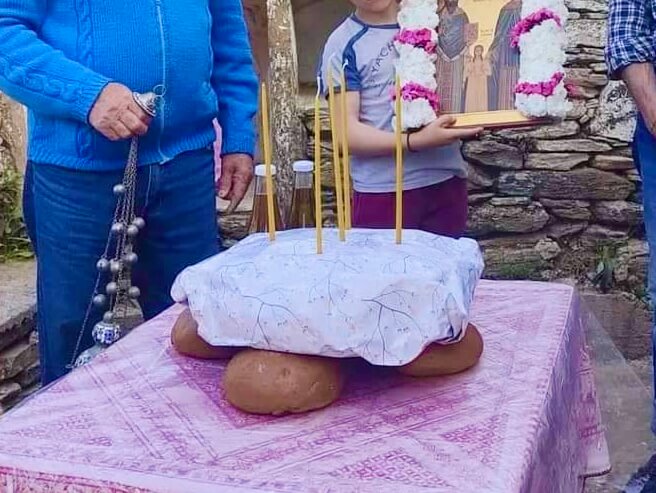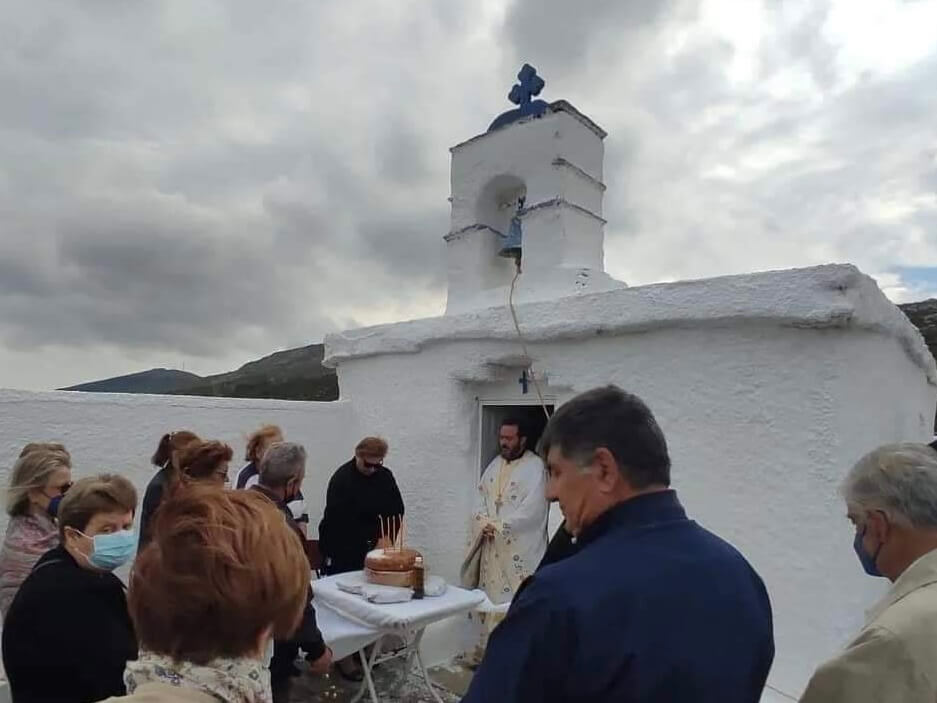Understanding Greek Name Days & How To Celebrate Them
Greek Island Bucket List is an Amazon Associate and participant in other affiliate programmes. I earn from qualifying purchases. Please see my disclaimer for more information.
The name day Greece tradition is something you might know about if you have a Greek friend. Or if you’ve spent any time in Greece you might have heard people talking about a name day celebration.
Name days aren’t exclusive to Greece and they’re traditional in other European countries too. But it didn’t take me long to discover how important Greek name days are in Greek culture, often much more so than birthdays.
What Are Greek Name Days?
Names Days are feast days in Greece. It’s when the Greek Orthodox religion commemorates a particular holy person, normally a saint or martyr. Orthodox churches are usually given the name of a saint. So the churches have feast days on the days of the year associated with their specific saints. They also have feast days to commemorate important events from the Bible.

If you look at the Orthodox calendar, you’ll see a saint’s feast day falls practically every day of the year. Greek names are traditionally ones that come from these Orthodox saints and martyrs. So you can imagine that lots of people are often celebrating together especially when it’s a popular first name.
How Children Are Named in Greece
In Greece, it’s traditional for babies to be named after their grandparents. But the traditions are followed in slightly different ways. It’s common for the eldest child to receive their Christian / given name from their paternal Grandparents. The second child would often then be named after a maternal Grandparent.
However, if the eldest son is the second child they would normally be named after the paternal grandfather. That way, the full name stays within the family and is passed down through another generation.

After the first two children, the next two might be named after the paternal grandmother and the maternal grandparent respectively. After that though what often happens is that a Godparent names the next child. Normally with their own name.
Traditionally there’s also an element of expectation. That is, children strive to attain the virtues of the saint they’ve been named after.
Logistics of a Smaller Pool of Names
Because of these traditions, numerous Greek people have the same Christian name. As Greek families often tend to be big, it can all get quite confusing. Several family members (cousins) can have not only the same Christian/first name but also the same surname.
I came to realise that’s why I was being asked for my father’s name on so many official documents. It’s basically a common part of any form, like asking for a maiden name might be in the UK. (And that’s a whole other story as women in Greece don’t take their husbands’ names when they marry.)
Nearly nine percent of the population share the most popular boys name. And it’s around the same for the most popular girls name. The top five most common names in Greece are:
Boys
- Giorgos
- Ioannis/Yiannis
- Dimitris
- Constantinos/Costas
- Nikolaos
Girls
- Maria
- Eleni
- Aikaterini/Katerina
- Vassiliki/Vaso
- Sofia
Challenges of Going Against Tradition
As I understand it, naming a baby in Greece can be quite a contentious issue. Nowadays it’s becoming more common for people to use a parent’s name as their children’s middle name. And/or forgo them completely in favour of a totally different name for their child.

You’ll also come across Greek people with ancient names. These aren’t associated with a particular saint from the Greek Orthodox Church and there are fewer of them.
Both these circumstances can be a bit tricky in a country of Orthodox Christians. Christenings /baptisms are an important milestone for young children here. But the Christian church often won’t christen a child with a Pagan-derived name.
So if a child has something modern from another culture or an ancient name that existed before the Orthodox Church it’s good for their middle name to be one of the more traditional Greek names. That way the baby will likely be accepted for christening.
And that’s important here. Because traditionally the child is referred to as the baby until they are christened. It’s only after that they can start using their name.
How to Celebrate a Name Day Greece Style
For those that do celebrate, a name day / saints’ day can be a big affair. That’s especially true when it’s one of the most popular name days. There’s usually a big celebration at the church in memory of the saint it’s been named after.
In my experience of the Greek islands, there are lots of small and sometimes remote churches. And often the only time I’ve ever seen them open is for the feast day of the saint. As part of the Greek Orthodox tradition, everybody traipses up a dirt road, a massive steep hill or across the water to a tiny islet where the church is.

A service is held and then food is shared. Sometimes people bring a special type of sweet bread, flavoured with aniseed. It’s blessed, along with bottles of wine and oil and then everything is shared.
At work, it’s common for the name day person who’s celebrating to bring in cakes or sweets. Their colleagues may give them a gift in return. If someone doesn’t work or isn’t at work on their name day then traditionally their home is seen as an open house. People will drop by whether invited or not.

They come with their hands full to deliver a small gift like flowers, chocolate or a bottle of wine. At the very least, a phone call or social media comment to wish them a happy name day – Χρόνια πολλά (Chronia Polla meaning many years) – and perhaps good health is expected.
How Do You Know When Your Name Day Is?
Greek people will know when their own name day is and the ones of close family and friends. There are also websites and apps to help you keep track if you’re interested.
While most Saints Days fall on specific days each year, some are moveable feasts. So people will celebrate their name day on different dates each year. It depends on when other feast days/holidays fall within that year.
For example, Agios Georgios Day, St George’s Day falls on 23rd April. But if the Greek Orthodox Easter comes after the 23rd (it’s different every year) then St George’s Day is celebrated on Easter Monday. In this instance, it’s because Lent and the Holy Week are periods of fasting. So it wouldn’t be much fun celebrating!

If someone’s name isn’t that of an Orthodox Christian saint (or the derivative of one) then they celebrate on All Saint’s Day. Agion Panton / All Saints day is much earlier in Greece than in the UK for example.
In the UK, All Saints Day is 1st November, the day after Halloween. In Greece, it’s 56 days/ 8th Sunday after Orthodox Easter Sunday and the first Sunday after Pentecost. Anyone who doesn’t have a dedicated name day the rest of the year gets to celebrate their name day then.
Now You Know How to Celebrate a Name Day in Greece
So there you go, know you know how to celebrate a name day in Greece. Go luck with keeping on top of which day of the year it is!
Many thanks to Katerina Pantazi in Andros for fact-checking this article and providing all photos used other than the featured image.

Suzie Young
Suzie writes informative posts for solo, nervous or first-time travellers to Greece, Turkey and other countries on her 50-before-50 bucket list. She became a Greek resident in 2020 and intends to visit every inhabited island (13 down!).
